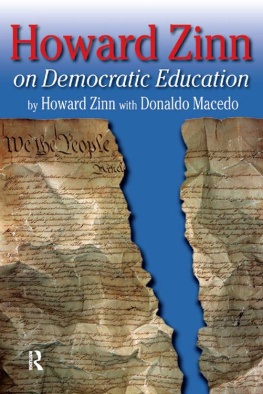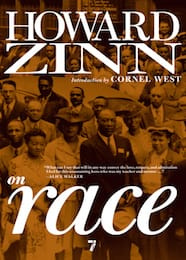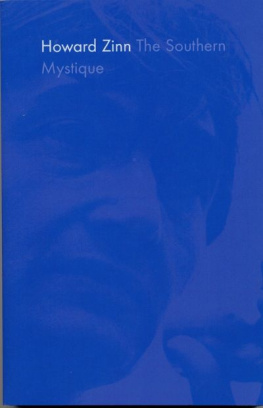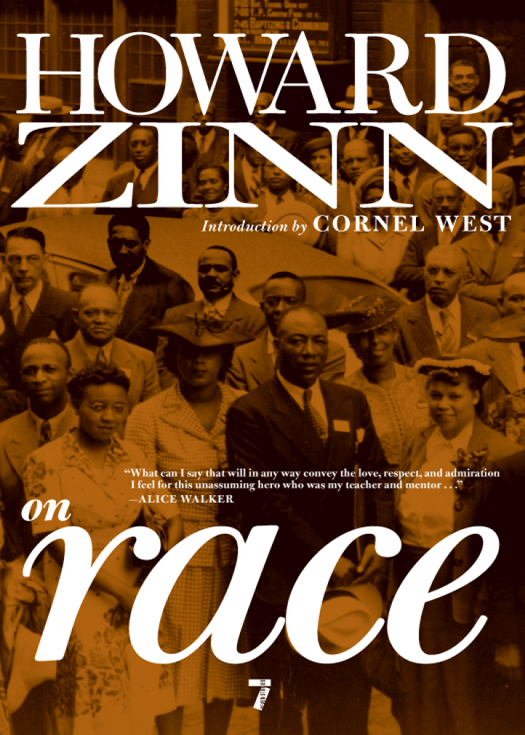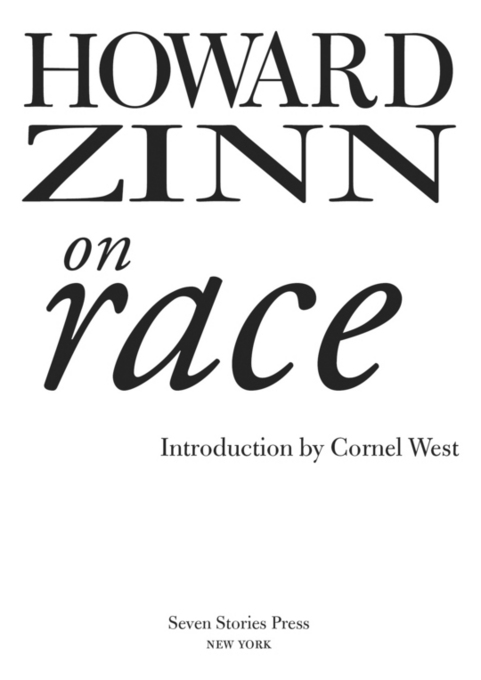Copyright 1959, 1960, 1962, 1963, 1965, 1968, 1973, 1975, 1982, 2006, 2008, and 2011 by Howard Zinn
Introduction 2011 by Cornel West
A Seven Stories Press First Edition
Most of the material in this book also appears in The Zinn Reader (Seven Stories Press, 1997) and The Zinn Reader, 2nd ed. (Seven Stories Press, 2009).
All rights reserved. No part of this book may be reproduced, stored in a retrieval system, or transmitted in any form, by any means, including mechanical, electronic, photocopying, recording or otherwise, without the prior written permission of the publisher.
Seven Stories Press
140 Watts Street
New York, NY 10013
www.sevenstories.com
Library of Congress Cataloging-in-Publication Data
Zinn, Howard, 1922-2010.
Howard Zinn on race / Howard Zinn ; introduction by Cornel West.
p. cm.
eISBN: 978-1-60980-334-6
1. United States--Race relations--History. 2. Racism--United States--History. 3. Race--Social aspects--United States. 4. Zinn, Howard, 1922-2010--Political and social views. I. Title.
E184.A1Z56 2011
305.800973--dc22
2011016362
College professors may order examination copies of Seven Stories Press titles for a free six-month trial period. To order, visit www.sevenstories.com/textbook, or fax on school letterhead to (212) 226-1411.
v3.1
I dont think it would be hard to imagine what King would be saying to us today. I think he would be protesting the war policies and militarism of this administration just as he protested the policies of the Johnson Administration. I think he would be demanding that the great wealth of this country not be used for war or militarism, but that the wealth of this country be used to give everybody, everybody, the things that they need to enjoy life including absolutely free healthcare for everybody. I think he would be demanding of the politicians and asking us to demand of the politicians not the puny reforms we see bandying about Congress, but fundamental change.
Howard Zinn, January 21, 2010, upon receiving the New York University Martin Luther King, Jr. Humanitarian Award
Contents
Introduction
by Cornel West
H oward Zinn was one of the greatest democratic intellectuals in the history of the U.S. Empire. He had a deep love for everyday people and a profound commitment to enhancing their plight. Hence, he looked at history and society through the lens of those Frantz Fanon called the wretched of the earthpoor and working people, women, gays and lesbians, indigenous people, Latinos, Asians, Jews, Arabs, and especially Black people. In fact, Howard Zinn was one of the few great non-black intellectuals to focus so intensely and insightfully on the suffering and resistance of Black people in the making of the U.S. experiment in democracy and imperial rule. Among his fellow historians, only Eric Foner and David Brion Davisthe two greatest living U.S. historiansshare his focus. Yet beyond even Foner and Davis, Zinn was an activist intellectual who moved smoothly from the library to the street, from the office to the jail, from the lecture room to the political rally. Zinn had more influence and impact on the public than any other intellectual of his generation. The unique fusion of his committed scholarship, political courage, and charismatic personality left indelible impressions and unforgettable imprints on all of us. My love and respect for Brother Howard was immeasurable. And as a free Black man who tries to link the life of the mind to the struggle for freedom, I always knew that Brother Howard was theretrustworthy, dependable, and reliable in our uphill battle for justice.
Howard Zinn was our grand long-distance runner alongside the poor and working people of the world. How sweet it is to remember his tender smile, subtle mind, tough grit, and loving heart by keeping his precious legacy alive. These rich and powerful writings on race remind us that in the age of Obama the U.S. Empire still hides and conceals forms of institutional and structural racism that permeate our schools, prisons, workplace, films, TVs and iPods. Let us never allow the prophetic voice of Howard Zinn to be silencedas the U.S. government and FBI preferred!
Cornel West
Princeton, February 2011
The Southern Mystique (1963)
I did not deliberately seek employment in a black college. I was only vaguely aware that such an institution existed when, in 1956, about to get my doctorate at Columbia University, I was introduced to the president of Spelman College, a college for African-American women in Atlanta, Georgia. He offered me a tempting jobchair of Spelmans department of history and social science. My wife and I, with our young son and daughter, spent the next seven years living in Atlantas black community, certainly the most interesting seven years of my life. I soon became involved, along with my students, in what came to be known affectionately as the movement. I did not see how I could teach about liberty and democracy in the classroom and remain silent about their absence outside the classroom. I became both participant in and chronicler of the growing conflict between the old Southern order of racial segregation, and the increasingly vocal demands for freedom and equality by Southern blacks. Some long-held notions about the South, white people and black people, were powerfully challenged by what I observed. I sent an article to Harpers Magazine, and to my surprise they accepted it. It was my first published article, and later became the basis for an essay I wrote for The American Scholar in the winter issue, 1963-64, and as the introductory chapter in my book The Southern Mystique (Alfred Knopf, 1964).
Do I stand by everything I wrote thirty years ago about the race question in the United States? That would mean I have learnednothing from all these years of turmoil. I undoubtedly would not write exactly the same way today. But I suppose I believe in the long-run validity of what I say in this essay, and so I unashamedly reproduce it here.
I t has occurred to me only recently that perhaps the most striking development in the South is not that the process of desegregation is under way, but that the mystique with which Americans have always surrounded the South is beginning to vanish.
Driving into Atlanta in a heavy rain one hot August night six and a half years ago, my wife and two small children waking up to watch the shimmering wet lights on Ponce de Leon Avenue, I was as immersed in this mystique as anyone else. For the last full day of driving, the talk and the look of people were different. The trees and fields seemed different. The air itself smelled different. This was the mysterious and terrible South, the Deep South, soaked in blood and history, of which Faulkner wroteand Margaret Mitchell, and Wilbur J. Cash. White Atlanta had been ravaged and still knew it. Negroes had been slaves and still remembered it. Northerners were strangers, no matter how long they stayed, and would never forget it.
There was something about Atlanta, about Georgia, the Carolinas, that marked them off as with a giant cleaver from the rest of the nation: the sun was hotter, the soil was redder, the people blacker and whiter, the air sweeter, heavier. But beyond the physical, beyond the strange look and smell of this country, was something more that went back to cotton and slavery, stretching into history as far as anyone could rememberan invisible mist over the entire Deep South, distorting justice, blurring perspective, and, most of all, indissoluble by reason.


